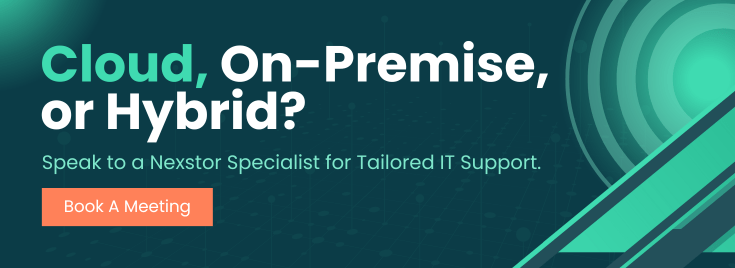The world of print, audio, and visual media is notoriously fast-paced and subject to change, presenting media organisations with a set of unique challenges when managing, storing, and distributing content. The sheer volume of data generated by articles, videos, audio, and images necessitates a robust and flexible solution for storage and collaboration.
 Hybrid cloud solutions offer a reliable and cost-effective approach, combining the best of both private and public clouds to meet the specific needs of media companies. In this article, we’ll discuss the advantages of cloud storage for media organisations.
Hybrid cloud solutions offer a reliable and cost-effective approach, combining the best of both private and public clouds to meet the specific needs of media companies. In this article, we’ll discuss the advantages of cloud storage for media organisations.

 Hybrid cloud solutions offer a reliable and cost-effective approach, combining the best of both private and public clouds to meet the specific needs of media companies. In this article, we’ll discuss the advantages of cloud storage for media organisations.
Hybrid cloud solutions offer a reliable and cost-effective approach, combining the best of both private and public clouds to meet the specific needs of media companies. In this article, we’ll discuss the advantages of cloud storage for media organisations.
Enhanced Storage Capabilities
Media organisations generate huge volumes of data on a daily basis, from high-resolution videos and audio recordings to complex graphics and lengthy articles. A hybrid cloud solution offers vast storage capacity that can be scaled to meet the organisation’s needs. By storing large media files in the cloud, media companies can avoid the high costs and maintenance associated with physical storage infrastructure, yet can ensure that files are accessible many years in the future. Furthermore, the hybrid cloud allows organisations to retain sensitive or frequently accessed files on-premises while offloading less critical data to the cloud, optimising storage efficiency.Remote Collaboration
Media teams are often dispersed across widespread locations, not only within the UK but also overseas. Cloud-based workflows enable geographically distributed teams to seamlessly collaborate on projects, eroding the barriers of dispersed working. For example, hybrid cloud solutions facilitate real-time collaboration on content creation, editing, and distribution, ensuring that all team members, regardless of their location, can effectively contribute. This fosters better creative team working, expedites project timelines, and enhances the overall quality of content.Robust Data Protection
Media organisations handle a wealth of sensitive information, including exclusive stories, confidential sources, and proprietary content. Protecting this data is essential for the integrity of the industry. Hybrid cloud solutions offer advanced security features, such as encryption and multi-factor authentication (MFA), to ensure that sensitive information is securely stored and accessed. With these measures in place, media organisations can safeguard their data against unauthorised access, accidental or malicious leaks, and cyberthreats, maintaining the integrity of their content and their reputation.Adaptability To Changing Circumstances
The media landscape is dynamic, with audience preferences and trends rapidly evolving. Hybrid cloud solutions offer the adaptability required to respond quickly to these changes. Whether it’s scaling up storage capacity during a major news event or deploying new applications to meet audience demands, hybrid clouds provide the resources needed for smooth operations. Enhanced flexibility leads to cost savings, as organisations only pay for what they use, and an improved return on investment by staying agile in a competitive industry.Dependable Disaster Recovery
In the event of unforeseen disruptions, such as natural disasters or technical failures, hybrid cloud solutions offer a lifeline for media organisations. By maintaining cloud backups, companies can ensure business continuity even in the face of significant challenges. Data loss or infrastructure outages become less disruptive when backups are readily available, enabling a quicker return to normal operations and minimising downtime.Find Out More
To learn how our hybrid cloud solutions can improve your media operations, making them more fluid, agile, and responsive, please get in touch with Nexstor today.

